people和person的区别
- 格式:doc
- 大小:21.50 KB
- 文档页数:3
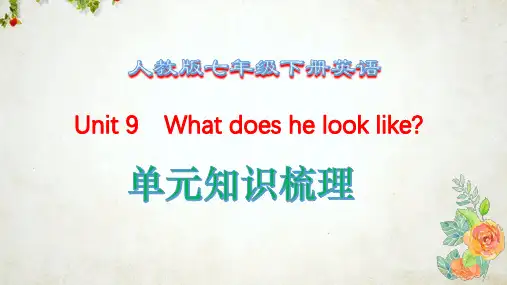
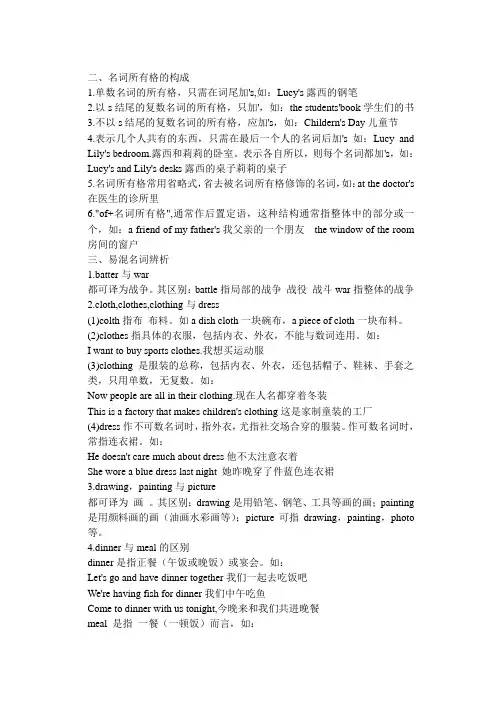
二、名词所有格的构成1.单数名词的所有格,只需在词尾加's,如:Lucy's露西的钢笔2.以s结尾的复数名词的所有格,只加',如:the students'book学生们的书3.不以s结尾的复数名词的所有格,应加's,如:Childern's Day儿童节4.表示几个人共有的东西,只需在最后一个人的名词后加's如:Lucy and Lily's bedroom.露西和莉莉的卧室。
表示各自所以,则每个名词都加's,如:Lucy's and Lily's desks露西的桌子莉莉的桌子5.名词所有格常用省略式,省去被名词所有格修饰的名词,如:at the doctor's 在医生的诊所里6."of+名词所有格",通常作后置定语,这种结构通常指整体中的部分或一个,如:a friend of my father's我父亲的一个朋友the window of the room 房间的窗户三、易混名词辨析1.batter与war都可译为战争。
其区别:battle指局部的战争战役战斗war指整体的战争2.cloth,clothes,clothing与dress(1)colth指布布料。
如a dish cloth一块碗布,a piece of cloth一块布料。
(2)clothes指具体的衣服,包括内衣、外衣,不能与数词连用。
如:I want to buy sports clothes.我想买运动服(3)clothing是服装的总称,包括内衣、外衣,还包括帽子、鞋袜、手套之类,只用单数,无复数。
如:Now people are all in their clothing.现在人名都穿着冬装This is a factory that makes children's clothing这是家制童装的工厂(4)dress作不可数名词时,指外衣,尤指社交场合穿的服装。
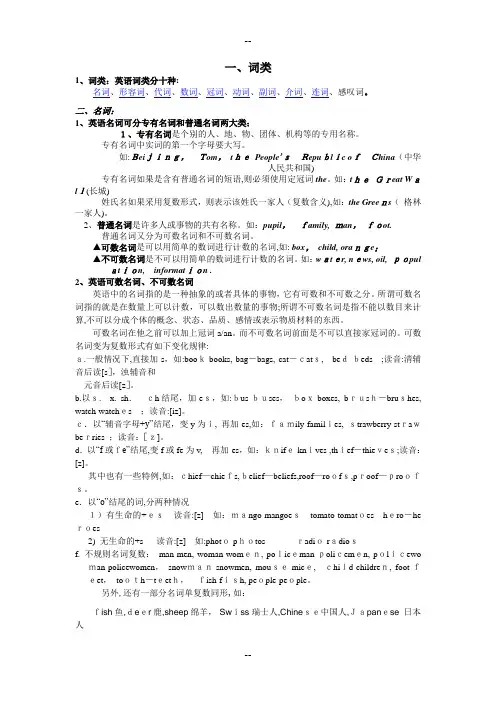
一、词类1、词类:英语词类分十种:名词、形容词、代词、数词、冠词、动词、副词、介词、连词、感叹词。
二、名词:1、英语名词可分专有名词和普通名词两大类:1、专有名词是个别的人、地、物、团体、机构等的专用名称。
专有名词中实词的第一个字母要大写。
如:Beijing,Tom,thePeople’sRepublic ofChina(中华人民共和国)专有名词如果是含有普通名词的短语,则必须使用定冠词the。
如:theGreat Wall(长城)姓氏名如果采用复数形式,则表示该姓氏一家人(复数含义),如:the Greens(格林一家人)。
2、普通名词是许多人或事物的共有名称。
如:pupil,family, man,foot.普通名词又分为可数名词和不可数名词。
▲可数名词是可以用简单的数词进行计数的名词,如: box,child, orange;▲不可数名词是不可以用简单的数词进行计数的名词。
如:water, news, oil, popul ation,information .2、英语可数名词、不可数名词英语中的名词指的是一种抽象的或者具体的事物,它有可数和不可数之分。
所谓可数名词指的就是在数量上可以计数,可以数出数量的事物;所谓不可数名词是指不能以数目来计算,不可以分成个体的概念、状态、品质、感情或表示物质材料的东西。
可数名词在他之前可以加上冠词a/an。
而不可数名词前面是不可以直接家冠词的。
可数名词变为复数形式有如下变化规律:a.一般情况下,直接加-s,如:book-books, bag-bags, cat-cats,bed-beds;读音:清辅音后读[s],浊辅音和元音后读[z]。
b.以s.x. sh.ch结尾,加-es,如:bus-buses,box-boxes, brush-brushes, watch-watches;读音:[iz]。
c.以“辅音字母+y”结尾,变y为i, 再加-es,如:family-families, strawberry-strawberries ;读音:[z]。
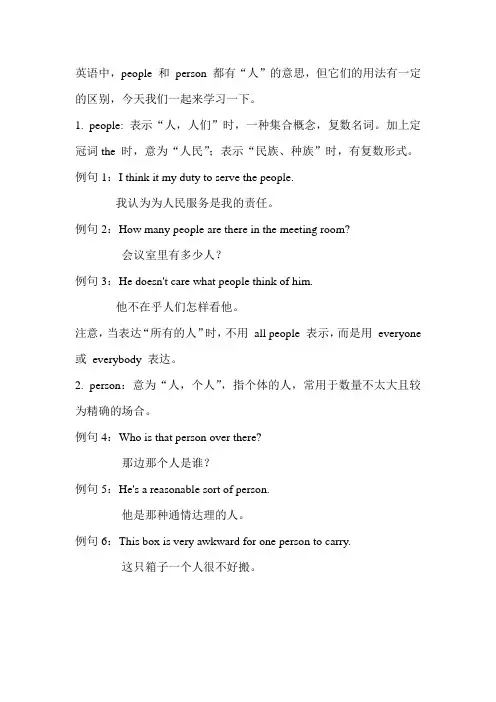
英语中,people 和person 都有“人”的意思,但它们的用法有一定的区别,今天我们一起来学习一下。
1. people: 表示“人,人们”时,一种集合概念,复数名词。
加上定冠词the 时,意为“人民”;表示“民族、种族”时,有复数形式。
例句1:I think it my duty to serve the people.
我认为为人民服务是我的责任。
例句2:How many people are there in the meeting room?
会议室里有多少人?
例句3:He doesn't care what people think of him.
他不在乎人们怎样看他。
注意,当表达“所有的人”时,不用all people 表示,而是用everyone 或everybody 表达。
2. person:意为“人,个人”,指个体的人,常用于数量不太大且较为精确的场合。
例句4:Who is that person over there?
那边那个人是谁?
例句5:He's a reasonable sort of person.
他是那种通情达理的人。
例句6:This box is very awkward for one person to carry.
这只箱子一个人很不好搬。
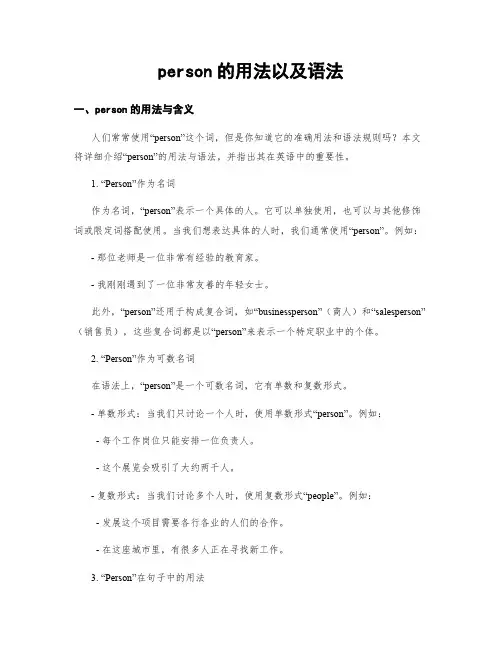
person的用法以及语法一、person的用法与含义人们常常使用“person”这个词,但是你知道它的准确用法和语法规则吗?本文将详细介绍“person”的用法与语法,并指出其在英语中的重要性。
1. “Person”作为名词作为名词,“person”表示一个具体的人。
它可以单独使用,也可以与其他修饰词或限定词搭配使用。
当我们想表达具体的人时,我们通常使用“person”。
例如:- 那位老师是一位非常有经验的教育家。
- 我刚刚遇到了一位非常友善的年轻女士。
此外,“person”还用于构成复合词,如“businessperson”(商人)和“salesperson”(销售员),这些复合词都是以“person”来表示一个特定职业中的个体。
2. “Person”作为可数名词在语法上,“person”是一个可数名词,它有单数和复数形式。
- 单数形式:当我们只讨论一个人时,使用单数形式“person”。
例如:- 每个工作岗位只能安排一位负责人。
- 这个展览会吸引了大约两千人。
- 复数形式:当我们讨论多个人时,使用复数形式“people”。
例如:- 发展这个项目需要各行各业的人们的合作。
- 在这座城市里,有很多人正在寻找新工作。
3. “Person”在句子中的用法作为主语或宾语,“person”在句子中扮演着重要角色。
当它作为主语时,需要与动词保持一致:- 每个参与者都必须遵守会议规定。
- 人们期待着明天能够看到改变。
当“person”作为宾语时,可以使用它直接接在及物动词后面。
例如:- 我还没有见过他这样开心过。
- 这部电影深深地打动了我。
二、person的语法细节“Person”的使用也需要我们理解一些语法细节:1. 可数名词的规则由于“person”是一个可数名词,所以当我们使用数字来修饰它时,需要注意确保数字和“person”的单复数形式一致。
- 正确:I have seen two people waiting at the bus stop.- 错误:I have seen two persons waiting at the bus stop.2. 引申用法除了表示具体的人以外,“person”还可以引申为指代任何类型的个体。
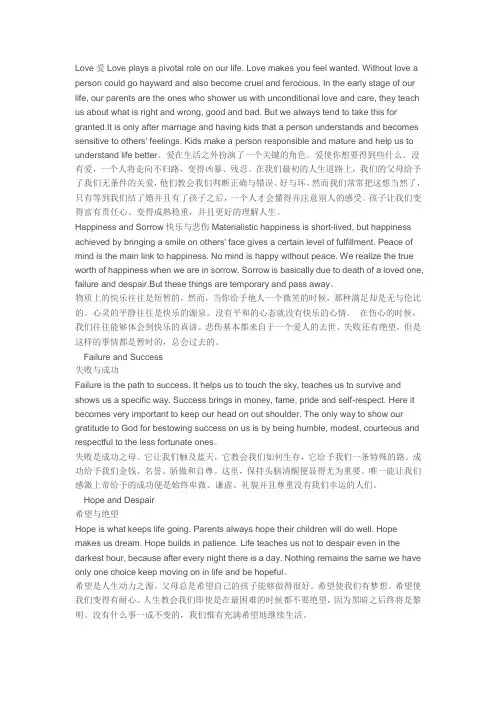
Love爱Love plays a pivotal role on our life. Love makes you feel wanted. Without love a person could go hayward and also become cruel and ferocious. In the early stage of our life, our parents are the ones who shower us with unconditional love and care, the y teach us about what is right and wrong, good and bad. But we always tend to take this for granted.It is only after marriage and having kids that a person understands and becomes sensitive to others' feelings. Kids make a person responsible and mature and help us to understand life better。
爱在生活之外扮演了一个关键的角色。
爱使你想要得到些什么。
没有爱,一个人将走向不归路,变得凶暴、残忍。
在我们最初的人生道路上,我们的父母给予了我们无条件的关爱,他们教会我们判断正确与错误、好与坏。
然而我们常常把这想当然了,只有等到我们结了婚并且有了孩子之后,一个人才会懂得并注意别人的感受。
孩子让我们变得富有责任心、变得成熟稳重,并且更好的理解人生。
Happiness and Sorrow快乐与悲伤Materialistic happiness is short-lived, but happiness achieved by bringing a smile on others' face gives a certain level of fulfillment. Peace of mind is the main link to happiness. No mind is happy without peace. We realize the true worth of happiness when we are in sorrow. Sorrow is basically due to death of a loved one, failure and despair.But these things are temporary and pass away。
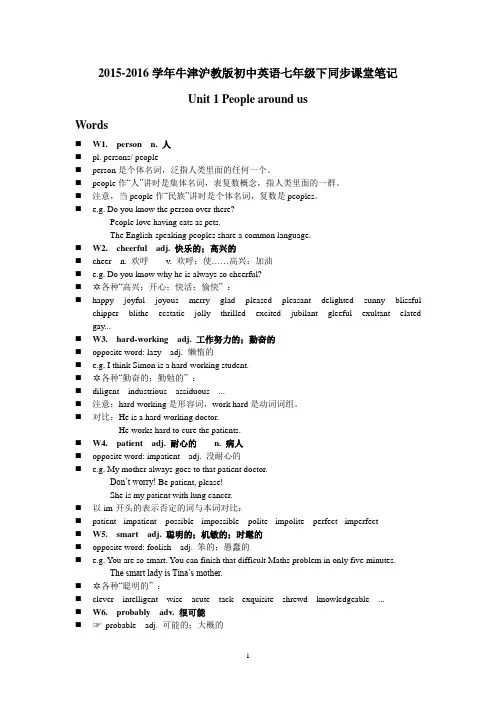
2015-2016学年牛津沪教版初中英语七年级下同步课堂笔记Unit 1 People around usWords⏹W1. person n. 人⏹pl. persons/ people⏹person是个体名词,泛指人类里面的任何一个。
⏹people作“人”讲时是集体名词,表复数概念,指人类里面的一群。
⏹注意,当people作“民族”讲时是个体名词,复数是peoples。
⏹ e.g. Do you know the person over there?People love having cats as pets.The English-speaking peoples share a common language.⏹W2. cheerful adj. 快乐的;高兴的⏹cheer n. 欢呼v. 欢呼;使……高兴;加油⏹ e.g. Do you know why he is always so cheerful?⏹✲各种“高兴;开心;快活;愉快” :⏹happy joyful joyous merry glad pleased pleasant delighted sunny blissfulchipper blithe ecstatic jolly thrilled excited jubilant gleeful exultant elated gay...⏹W3. hard-working adj. 工作努力的;勤奋的⏹opposite word: lazy adj. 懒惰的⏹ e.g. I think Simon is a hard-working student.⏹✲各种“勤奋的;勤勉的” :⏹diligent industrious assiduous ...⏹注意:hard-working是形容词,work hard是动词词组。
⏹对比:He is a hard-working doctor.He works hard to cure the patients.⏹W4. patient adj. 耐心的n. 病人⏹opposite word: impatient adj. 没耐心的⏹ e.g. My mother always goes to that patient doctor.Don‟t worry! Be patient, please!She is my patient with lung cancer.⏹以im-开头的表示否定的词与本词对比:⏹patient - impatient possible - impossible polite - impolite perfect - imperfect⏹W5. smart adj. 聪明的;机敏的;时髦的⏹opposite word: foolish adj. 笨的;愚蠢的⏹ e.g. You are so smart. You can finish that difficult Maths problem in only five minutes.The smart lady is Tina‟s mother.⏹✲各种“聪明的” :⏹clever intelligent wise acute tack exquisite shrewd knowledgeable ...⏹W6. probably adv. 很可能⏹☞probable adj. 可能的;大概的⏹ e.g. You are probably right.It was probably her most popular song.⏹✲各种“很可能;或许;也许” :⏹maybe likely perhaps possibly ...⏹W7. forget v. 忘记⏹☞forget - forgetting forget - forgot - forgotten⏹opposite word: remember v. 记得⏹☃玩转forget:⏹forget后接人或事、物,表示“忘记某人/某事/某物”:⏹ e.g. He forgot the name of his primary school class teacher.⏹forget后接to do sth表示“忘记去做某事(还没做)”(forget to do sth):⏹ e.g. Don‟t forget to reply to Jane in the morning.⏹forget后接doing sth表示“忘记做过某事(做完了)”(forget doing sth):⏹ e.g. He forgot buying that scarf in Paris.⏹☃玩转remember:⏹remember后接人或事、物,表示“记得某人/某事/某物”:⏹ e.g. Mary remembered her middle school English teacher.⏹remember后接to do sth表示“记得去做某事(还没做)”⏹(remember to do sth):⏹ e.g. You should remember to reply to Jane in the morning.⏹remember后接doing sth表示“忘记做过某事(做完了)”⏹(remember doing sth):⏹ e.g. I remember seeing the man somewhere.⏹W8. smell n. 气味v. 闻;嗅⏹ e.g. Many people don‟t like the smell of durians.⏹☃玩转smell(作动词):⏹(1)smell作行为动词时,后面直接跟宾语:⏹ e.g. Smell the perfume. Do you like it?⏹(2)smell作系动词时,后接形容词来修饰主语:⏹ e.g. The meat smells nice, but tastes terrible.⏹✲各种系动词:⏹be [am, is, are](状态系动词);keep, rest, remain, stay, lie, stand(持续系动词);seem, appear,look(表象系动词);feel, sound, smell, taste(感官系动词);become, grow, turn, fall, get, go, come, run(变化系动词);prove, turn out(终止系动词)...⏹W9. care n. 照顾v. 关心;关注;在乎⏹ e.g. Baby dogs and cats need a lot of care.⏹The only thing he cares about is money.⏹☃玩转care:⏹careful adj. 仔细的;小心的careless adj. 粗心的;漫不经心的carefully adv. 仔细地;小心地carelessly adv. 粗心地;草率地carefulness n. 仔细;慎重carelessness n. 粗心大意;草率⏹✲各种care:⏹(1)care about sth 担心/在乎某事 e.g. She doesn‟t care about money.⏹(2)take care of sb 照顾某人 e.g. I‟ll take care of myself.⏹(3)care for sb 照顾某人(病人) e.g. She cared for her father in his dying year.⏹(4)care for sth 想要某物 e.g. Would you care for a drink?⏹(5)care to do sth 愿意做某事(用于礼貌性话语)= be willing to do sthe.g. Would you care to wait here, sir?⏹W10. miss v. 想念,怀念;错过;过失n. 小姐;女士(用于未婚的女性,放在姓之前,要大写)⏹ e.g. I miss my classmates in my primary school.⏹He missed the ball.⏹Are you Miss Huang?⏹W11. joke n. 玩笑v. 说笑话;开玩笑⏹ e.g. He is full of fun. He always tell jokes to make us laugh.⏹I didn‟t get the joke.⏹They are laughing and joking together.⏹☃玩转joke:⏹play a joke on sb 开某人玩笑have a joke 说笑话;开玩笑⏹Are you joking (me)? = Are you kidding (me)? 你在(和我)开玩笑吗?⏹W12. laugh v. 玩笑⏹☞laughter n. 笑;笑声⏹注意:laugh中的的gh发/ f /音。

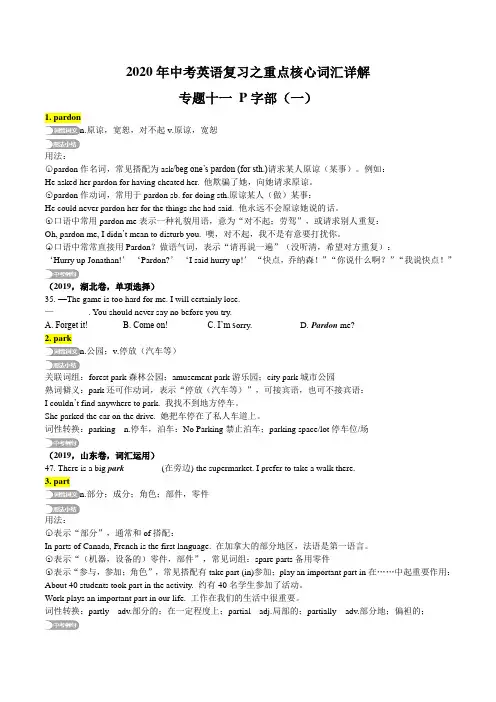
2020年中考英语复习之重点核心词汇详解专题十一P字部(一)1. pardonn.原谅,宽恕,对不起v.原谅,宽恕用法:○1pardon作名词,常见搭配为ask/beg one’s pardon (for sth.)请求某人原谅(某事)。
例如:He asked her pardon for having cheated her. 他欺骗了她,向她请求原谅。
○2pardon作动词,常用于pardon sb. for doing sth.原谅某人(做)某事:He could never pardon her for the things she had said. 他永远不会原谅她说的话。
○3口语中常用pardon me表示一种礼貌用语,意为“对不起;劳驾”,或请求别人重复:Oh, pardon me, I didn’t mean to disturb you. 噢,对不起,我不是有意要打扰你。
○4口语中常常直接用Pardon?做语气词,表示“请再说一遍”(没听清,希望对方重复):‘Hurry up Jonathan!’‘Pardon?’‘I said hurry up!’“快点,乔纳森!”“你说什么啊?”“我说快点!”(2019,湖北卷,单项选择)35. —The game is too hard for me. I will certainly lose.—_______. You should never say no before you try.A. Forget it!B. Come on!C. I’m s orry.D. Pardon me?2. parkn.公园;v.停放(汽车等)关联词组:forest park森林公园;amusement park游乐园;city park城市公园熟词僻义:park还可作动词,表示“停放(汽车等)”,可接宾语,也可不接宾语:I couldn’t find anywhere to park. 我找不到地方停车。
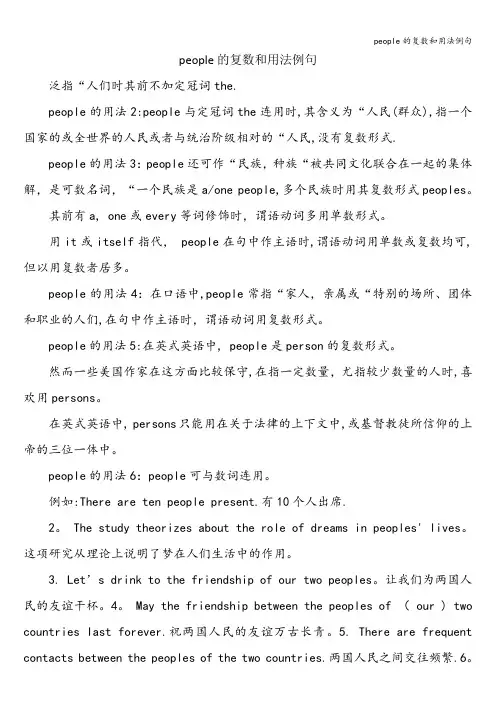
people的复数和用法例句泛指“人们时其前不加定冠词the.people的用法2:people与定冠词the连用时,其含义为“人民(群众),指一个国家的或全世界的人民或者与统治阶级相对的“人民,没有复数形式.people的用法3:people还可作“民族,种族“被共同文化联合在一起的集体解,是可数名词,“一个民族是a/one people,多个民族时用其复数形式peoples。
其前有a, one或every等词修饰时,谓语动词多用单数形式。
用it或itself指代, people在句中作主语时,谓语动词用单数或复数均可,但以用复数者居多。
people的用法4:在口语中,people常指“家人,亲属或“特别的场所、团体和职业的人们,在句中作主语时,谓语动词用复数形式。
people的用法5:在英式英语中, people是person的复数形式。
然而一些美国作家在这方面比较保守,在指一定数量,尤指较少数量的人时,喜欢用persons。
在英式英语中, persons只能用在关于法律的上下文中,或基督教徒所信仰的上帝的三位一体中。
people的用法6:people可与数词连用。
例如:There are ten people present.有10个人出席.2。
The study theorizes about the role of dreams in peoples' lives。
这项研究从理论上说明了梦在人们生活中的作用。
3. Let’s drink to the friendship of our two peoples。
让我们为两国人民的友谊干杯。
4。
May the friendship between the peoples of ( our ) two countries last forever.祝两国人民的友谊万古长青。
5. There are frequent contacts between the peoples of the two countries.两国人民之间交往频繁.6。
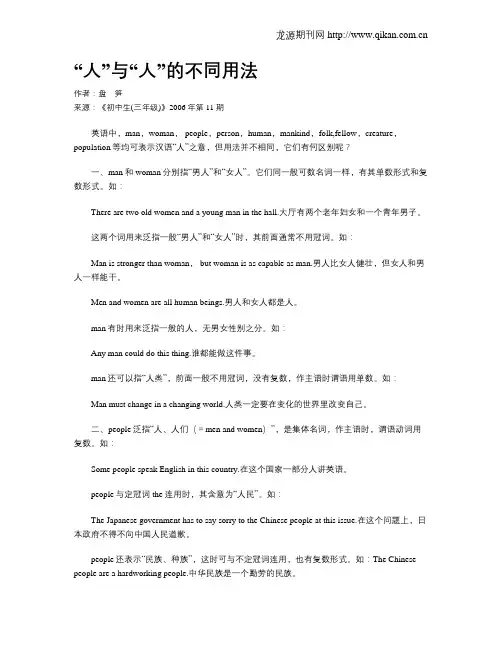
“人”与“人”的不同用法作者:盘笋来源:《初中生(三年级)》2006年第11期英语中,man,woman, people,person,human,mankind,folk,fellow,creature,population等均可表示汉语“人”之意,但用法并不相同,它们有何区别呢?一、man和woman分别指“男人”和“女人”。
它们同一般可数名词一样,有其单数形式和复数形式。
如:There are two old women and a young man in the hall.大厅有两个老年妇女和一个青年男子。
这两个词用来泛指一般“男人”和“女人”时,其前面通常不用冠词。
如:Man is stronger than woman, but woman is as capable as man.男人比女人健壮,但女人和男人一样能干。
Men and women are all human beings.男人和女人都是人。
man有时用来泛指一般的人,无男女性别之分。
如:Any man could do this thing.谁都能做这件事。
man还可以指“人类”,前面一般不用冠词,没有复数,作主语时谓语用单数。
如:Man must change in a changing world.人类一定要在变化的世界里改变自己。
二、people泛指“人、人们(=men and women)”,是集体名词,作主语时,谓语动词用复数。
如:Some people speak English in this country.在这个国家一部分人讲英语。
people与定冠词the连用时,其含意为“人民”。
如:The Japanese government has to say sorry to the Chinese people at this issue.在这个问题上,日本政府不得不向中国人民道歉。
people还表示“民族、种族”,这时可与不定冠词连用,也有复数形式。
英语重点词汇problem、question 的用法解析我们平时会发现2个频率高、易混淆的英语单词,它们是:question \problem --------问题person\ human \ people\man\ human being\mankind -----人类区分:一、problem和question都有“问题”的意思,但用法却不尽相同:[解题过程]I.problem指说话者认为难以解决的问题,它与动词solve或settle(解决)搭配。
而question指说话者需要寻找答案的问题,它常与动词ask或answer连用。
试比较:①The problem is difficult to be solved.这个问题很难解决。
②May I ask you some questions?我可以问你一些问题吗?II.problem可用于数学或物理的习题,而question却无此义。
question可表示一件“与……有关的事”。
试比较:①Can you work out this maths problem ?你能算出这道数学题吗?②It's a question of money /time.这是一个与金钱/时间有关的问题。
III.指需要讨论或解决的问题时,problem与question可以互换。
如:We are going to talk about several problems(questions)at the meeting .我们在会上要谈到一些问题。
解释:problem 指困难问题,社会问题,数学问题,常与动词solve(解决)搭配。
question指提出并等待回答的询问、质问,常与动词answer(回答)搭配。
辨析person\ human \ people\man\ human being\mankind一、指意不同1、human强调“人群”。
2、man指各时代的全体人类,特指男人。
people的复数和用法例句泛指“人们时其前不加定冠词the。
people的用法2:people与定冠词the连用时,其含义为“人民(群众),指一个国家的或全世界的人民或者与统治阶级相对的“人民,没有复数形式。
people的用法3:people还可作“民族,种族“被共同文化联合在一起的集体解,是可数名词,“一个民族是a/one people,多个民族时用其复数形式peoples。
其前有a, one或every等词修饰时,谓语动词多用单数形式。
用it或itself指代, people在句中作主语时,谓语动词用单数或复数均可,但以用复数者居多。
people的用法4:在口语中,people常指“家人,亲属或“特别的场所、团体和职业的人们,在句中作主语时,谓语动词用复数形式。
people的用法5:在英式英语中, people是person的复数形式。
然而一些美国作家在这方面比较保守,在指一定数量,尤指较少数量的人时,喜欢用persons。
在英式英语中, persons只能用在关于法律的上下文中,或基督教徒所信仰的上帝的三位一体中。
people的用法6:people可与数词连用。
例如:There are ten people present.有10个人出席。
2. The study theorizes about the role of dreams in peoples' lives.这项研究从理论上说明了梦在人们生活中的作用。
3. Let's drink to the friendship of our two peoples.让我们为两国人民的友谊干杯.4. May the friendship between the peoples of ( our ) two countries last forever.祝两国人民的友谊万古长青.5. There are frequent contacts between the peoples of the two countries.两国人民之间交往频繁.6. The magazine becomes a cultural medium of intercourse between the twopeoples.该杂志成为两民族间文化交流的媒介.7. Some peoples are yellow races.有些民族是黄色人种.8. The friendship between the two peoples is everlasting.两国人民的友谊永存.9. Our Parliament has been a beacon of hope to the peoples of Europe.我们的国会一直是欧洲各族人民的希望之灯。
people 怎么读
“People”是一个常用的英语单词,发音为英式音标/ˈpiːpl/,美式音标/ˈpipəl/。
作为名词,它的主要含义是“人”或“人们”,通常用来指代一群人,而不只是单独的一个个体。
在发音时,首先发出清晰的“P”音,然后过渡到“ee”,接着是“pl”。
注意,“People”是一个双音节词,重音落在第一个音节“Pe”上。
“People”在社会和文化中扮演着重要的角色。
它不仅仅是一个简单的称呼,更代表着一种集体意识和社交关系。
人们通过“People”这个词来强调群体的力量、多样性和相互之间的联系。
在政治、经济、社会等各个领域,人们都以“People”为核心,追求公平、正义和繁荣。
除了作为名词使用,“People”还可以用作形容词,表示“人民的”或“民众的”。
此外,它还可以用作及物动词,表示“使居住于”或“使从事”。
总之,“People”是一个简单而重要的英语单词。
通过掌握其准确发音和多种词性用法,我们可以更好地理解和使用这个词汇,同时也能够更加深入地感受到集体意识和社交关系的重要性。
无论是在日常生活中还是在特定的文化背景下,“People”都是一个充满力量和意义的词汇。
people的用法和短语例句people 有人;人民;人们等意思,那么你知道people 的用法吗?下面跟着一起来学习一下,希望对大家的学习有所帮助!people 的用法:people 的用法1:people的基本意思是“人,人们”,是集体名词,没有复数形式,在句中作主语时,谓语动词用复数。
泛指“人们”时其前不加定冠词the。
people 的用法2:people与定冠词the连用时,其含义为“人民(群众)”,指一个国家的或全世界的人民或者与统治阶级相对的“人民”,没有复数形式。
people 的用法3:people还可作“民族,种族”“被共同文化联合在一起的集体”解,是可数名词,“一个民族”是a/one people,多个民族时用其复数形式peoples。
其前有a, one或every等词修饰时,谓语动词多用单数形式。
用it或itself指代, people在句中作主语时,谓语动词用单数或复数均可,但以用复数者居多。
people 的用法4:在口语中,people常指“家人,亲属”或“特别的场所、团体和职业的人们”,在句中作主语时,谓语动词用复数形式。
people 的用法5:在英式英语中, people是person的复数形式。
然而一些美国作家在这方面比较保守,在指一定数量,尤指较少数量的人时,喜欢用persons。
在英式英语中, persons只能用在关于法律的上下文中,或基督教徒所信仰的上帝的三位一体中。
people 的用法6:people用作动词时意思是“使住着人,使有居民”。
people 的用法7:people还可表示“使…充满”,常与with连用,多用于文学语言中,且常用于被动结构。
people 的常用短语:用作名词(n.)of all people用作动词(v.)people with (v.+prep.)people 的用法例句:1. You can chat to other people who are online.你可以和其他在线的人聊天。
不规则复数形式有些可数名词的复数形式没有规则。
不规则复数形式主要有如下几种情况:特殊的复数形式英语中有很多名词的复数形式非常特殊,主要有如下几种情况:(1)集体名词:集体名词不能运用具体的数字修饰,下面的集体名词,不能用a,one,two等修饰,只能在其前加the表示“全体……”。
the police警察(指全体警察the English英国人(指全体英国人)the French法国人(指全体法国人) the Swiss瑞士人(指全体瑞士人)特别提示:“某国人”的表达法:a Chinese—two Chinese a Japanese—two Japanesean Australian—two Australians a Frenchman—two Frenchmen既可以说I’m Chinese.也可以说I’m a Chinese.可以说I’m English.或I’m an English boy.但不可以说I’m an English.在初中阶段我们所学的类似的词就是English和French.有些集体名词在改变表达方式后可以用具体数字修饰。
a policeman一位警察two policewomen两位女警察two English girls两个英国女孩two French boys两个法国男孩(2)复合名词a woman teacher—women teachers女教师an Englishman—Englishmen英国男子a grown-up—grown-ups成人a passer-by—passers-by过路人a brother-in-law—brothers-in-law内兄、内弟、小叔、大伯注意:man,woman作定语修饰复数时,需变为复数形式。
而girl,boy作定语修饰复数时则不变。
two men doctors两位男医生three girl students三名女学生(3)同时具有两种复数形式:有的名词当具有不同的含义时,其相应的复数形式也不相同。
people和person的区别
people【复数】 people
Human beings considered as a group or in indefinite numbers:
人类:被看做整体或不定数量的人类:
People were dancing in the street. I met all sorts of people.
人们在街上跳舞。
我遇到了各种各样的人
A body of persons living in the same country under one national government; a nationality.
同胞:住在同一国家、受同一政府管辖的一些人;民族
pl. peo.ples A body of persons sharing a common religion, culture, language, or inherited condition of life.
【复数】 peo.ples 民族:有共同的宗教信仰、文化、语言或继承同一种生活条件的人的群体
Persons with regard to their residence, class, profession, or group:
同类人:由于同样的居住地、阶级、职业或群体而联系在一起的人:
city people.
城市人
The mass of ordinary persons; the populace. Used withthe :
大众:平凡人的群体;大众。
与the 连用:
“those who fear and distrust the people, and wish to draw all powers from them into the hands of the hi gher classes”(Thomas Jefferson)
“那些害怕且不信任群众的人,想把所有的权力都集中到上层阶级手上”(托马斯·杰弗逊) The citizens of a political unit, such as a nation or a state; the electorate. Used withthe.
公民:某政治团体例如一个民族或一个国家的成员;选民。
与the 连用
Persons subordinate to or loyal to a ruler, a superior, or an employer:
臣民:受辖制或忠诚于其某一统治者、上司或雇主的人:
The queen showed great compassion for her people.
女王对她的臣民很仁慈
Family, relatives, or ancestors.
家人,亲戚,祖先
Informal Animals or other beings distinct from human beings:
【非正式用语】动物:明显区别于人类的动物或其他生灵:
Rabbits and squirrels are the furry, little people of the woods.
兔子和松鼠是森林中毛茸茸的小生灵
v.tr.(及物动词)
peo.pled,peo.pling,peo.ples
To furnish with or as if with people; populate.
繁衍:分布或似乎分布着人;居住
person A living human being. Often used in combination:
人:一活着的个人。
常用于合成词中:
chairperson; spokesperson; salesperson.
主席;发言人;销售员
An individual of specified character:
个人:有特定性格的人:
a person of importance.See Usage Note at man
重要人物参见 man
The composite of characteristics that make up an individual personality; the self. 本性:组成个人的性格特征总和;本性
The living body of a human being:
身体,躯体:人的活着的身体:
searched the prisoner's person.
搜身
Physique and general appearance.
形体,外貌:体格或总体上的外表
Law A human being or an organization with legal rights and duties.
【法律】自然人;法人:具有法律权利和义务的自然人和组织
Theology The separate individualities of the Father, Son, and Holy Spirit, as distinguished from the essence of the Godhead that unites them.
【神学】三位一体的位:圣父、圣子和圣灵的独立的位,以区别于统一他们的上帝的实体Grammar
【语法】
Any of three groups of pronoun forms with corresponding verb inflections that distinguish the speaker (first person), the individual addressed (second person), and the individual or thing spoken of (third person).
人称:指关系到谓语动词变化的三类人称形式,用以区别说话人(第一人称)、与之交谈的人(第二人称)和提及的人或东西(第三人称)
Any of the different forms or inflections expressing these distinctions.
表示某人称的词形:表示这些区别的不同的形式或变化
A character or role, as in a play; a guise:
角色,身份:戏剧中的角色;装扮:
“Well, in her person, I say I will not have you”(Shakespeare)
“好啦,对于她的角色,我说我不会让你来演”(莎士比亚)。